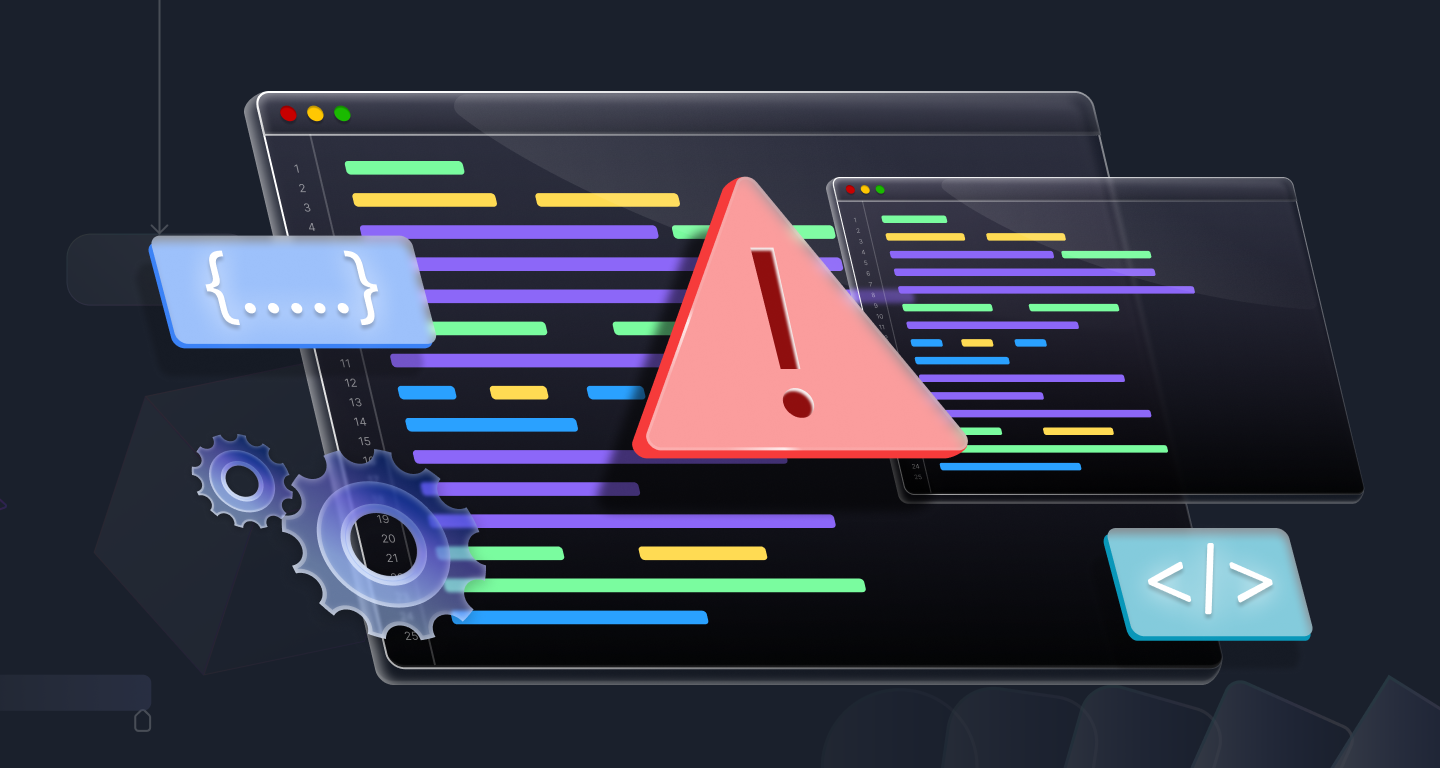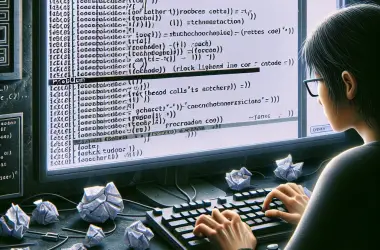Navigating the Maze: Common Programming Errors and Their Solutions

Programming errors are an inevitable part of the software development process, and debugging them can often be a frustrating and time-consuming task. By recognizing and understanding common programming errors, developers can quickly identify and resolve problems as they arise. This article explores some of the most frequent programming errors and provides guidance on addressing them.

-
1. Syntax Errors:
Syntax errors prevent the program from executing because the code does not conform to the programming language’s grammar. These errors can often be identified by the compiler or interpreter during the compilation or interpretation phase. Examples of syntax errors include missing semicolons, unmatched parentheses, and invalid variable declarations. To resolve syntax errors, developers must carefully review the code and ensure it adheres to the language’s syntax rules. -
2. Semantic Errors:
Semantic errors are more complex than syntax errors because they do not prevent the program from running. However, they can lead to incorrect program behavior and unexpected results. Semantic errors occur when the program contains statements that are grammatically correct but do not perform the intended operation. For example, using an incorrect data type for a variable, or calling a function with the wrong number of arguments. Debugging semantic errors requires thorough analysis of the program’s logic and execution to identify the source of the problem. -
3. Logic Errors:
Logic errors result from incorrect reasoning in the program’s design or implementation. They allow the program to run without syntax errors but fail to produce the desired results. Logic errors can be challenging to debug as they often manifest in subtle or unexpected ways. To resolve logic errors, developers must carefully examine the program’s logic and verify that it aligns with the intended behavior. This may involve creating test cases, performing manual code inspections, or using debugging tools. -
4. Out-of-bounds Errors:
Out-of-bounds errors occur when accessing memory locations outside the allocated bounds, which can result in memory corruption or segmentation faults. These errors often indicate a problem in array or pointer handling. To prevent out-of-bounds errors, developers should ensure that all array and pointer references are within the valid bounds of their respective data structures. Additionally, they should use bounds-checking mechanisms to detect and handle out-of-bounds access attempts gracefully. -
5. Null Pointer Errors:
A null pointer error occurs when a program attempts to access a memory location that has not been assigned a valid address. These errors can lead to program crashes or undefined behavior. To avoid null pointer errors, developers should always check that pointers are not null before dereferencing them. This can be achieved by using null pointer checks or by initializing pointers with a valid address before using them. -
6. Race Conditions:
Race conditions arise when multiple threads or processes access shared resources simultaneously, leading to inconsistencies or incorrect results. These errors can be challenging to detect and debug due to their non-deterministic nature. To prevent race conditions, developers should implement synchronization mechanisms such as locks or semaphores to control access to shared resources and ensure data integrity. -
7. Memory Leaks:
Memory leaks occur when a program allocates memory but fails to release it when it is no longer needed. Over time, memory leaks can accumulate and cause the program to run out of memory, leading to crashes or performance degradation. To avoid memory leaks, developers should use memory management best practices such as proper memory allocation and deallocation techniques, and use tools that provide robust memory management features.
By understanding common programming errors and adopting effective debugging strategies, developers can navigate the maze of programming challenges and deliver high-quality, reliable software. Regular code reviews, testing, and the use of debugging tools can further enhance error detection and resolution, ultimately leading to efficient and successful software development projects.# Navigating The Maze: Common Programming Errors And Their Solutions

Executive Summary
Programming can be a complex and challenging field, and it is not uncommon to encounter errors along the way. These errors can range from simple syntax mistakes to more complex logical errors. In this guide, we will explore some of the most common programming errors and provide solutions to help you troubleshoot and resolve them.
Introduction
Programming errors are an inevitable part of the development process. By understanding the causes and solutions to these errors, you can save time and effort in the long run. In this guide, we will provide a comprehensive overview of the most common programming errors, including syntax errors, logical errors, and runtime errors.
Frequently Asked Questions
What are the most common types of programming errors?
The most common types of programming errors include syntax errors, logical errors, and runtime errors. Syntax errors occur when the code does not adhere to the rules of the programming language. Logical errors occur when the code is syntactically correct but does not produce the desired output. Runtime errors occur when the program encounters an error while executing.
What are the best practices for avoiding programming errors?
There are several best practices that can help you avoid programming errors, including using a consistent coding style, writing clear and concise code, and testing your code regularly. Additionally, using a debugger can help you identify and resolve errors more quickly.
How can I resolve programming errors?
The first step in resolving a programming error is to identify the cause of the error. This can be done by examining the error message, reviewing the code, and using a debugger. Once the cause of the error has been identified, you can take steps to correct it and prevent it from recurring in the future.
Common Programming Errors and Their Solutions
Syntax Errors
Syntax errors occur when the code does not adhere to the rules of the programming language. These errors are typically easy to identify and resolve.
- Invalid Syntax: The code contains invalid syntax, such as missing parentheses or brackets.
- Mismatched Types: The code attempts to use a value of one type with a value of another incompatible type.
- Undeclared Variables: The code uses a variable that has not been declared.
- Incorrect Operators: The code uses an incorrect operator, such as using the ‘+’ operator for concatenation instead of addition.
Logical Errors
Logical errors occur when the code is syntactically correct but does not produce the desired output. These errors can be more difficult to identify and resolve than syntax errors.
- Off-by-One Errors: The code contains an error that is off by one, such as using the wrong index to access an array element.
- Infinite Loops: The code contains a loop that does not have a termination condition, causing the program to run indefinitely.
- Incorrect Conditions: The code uses an incorrect condition in an if statement or loop, causing the program to execute the wrong code.
- Uninitialized Variables: The code uses a variable that has not been assigned a value, leading to unpredictable behavior.
Runtime Errors
Runtime errors occur when the program encounters an error while executing. These errors can be caused by a variety of factors, such as invalid input or memory errors.
- Division by Zero: The code attempts to divide a number by zero, which is undefined.
- Array Index Out of Bounds: The code attempts to access an element of an array using an index that is outside the bounds of the array.
- Invalid Pointer Dereference: The code attempts to access memory using an invalid pointer, leading to a segmentation fault or other errors.
- Memory Leaks: The code allocates memory but does not release it, leading to a gradual decrease in available memory and potential program crashes.
Conclusion
Programming errors are a common part of the development process, but they can be frustrating and time-consuming to resolve. By understanding the causes and solutions to these errors, you can save time and effort in the long run. Remember to use best practices, such as writing clear and concise code, testing your code regularly, and using a debugger. With practice and experience, you will become more proficient at identifying and resolving programming errors, allowing you to build more robust and reliable software.
Keyword Tags
- Programming Errors
- Syntax Errors
- Logical Errors
- Runtime Errors
- Debugging

